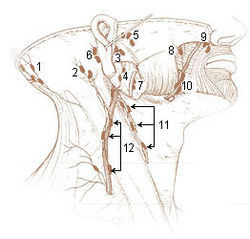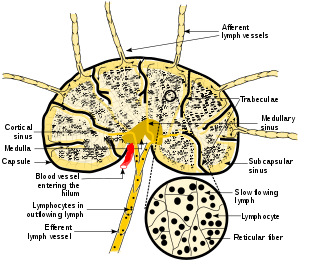
A lymph node, or lymph gland, is a kidney-shaped organ of the lymphatic system and the adaptive immune system. A large number of lymph nodes are linked throughout the body by the lymphatic vessels. They are major sites of lymphocytes that include B and T cells. Lymph nodes are important for the proper functioning of the immune system, acting as filters for foreign particles including cancer cells, but have no detoxification function.

Inguinal lymph nodes are lymph nodes in the human groin. Located in the femoral triangle of the inguinal region, they are grouped into superficial and deep lymph nodes. The superficial have three divisions: the superomedial, superolateral, and inferior superficial.

The right and left paratracheal lymph nodes are lymph nodes in the neck situated lateral to the trachea and esophagus alongside the recurrent laryngeal nerve. They drain to the deep cervical lymph nodes.

The external iliac lymph nodes are lymph nodes, from eight to ten in number, that lie along the external iliac vessels.
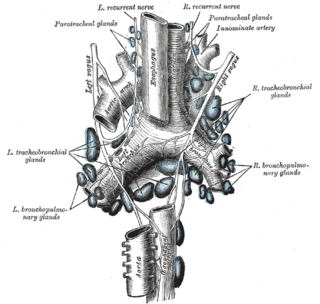
The tracheobronchial lymph nodes are lymph nodes that are located around the division of trachea and main bronchi.

The pararectal lymph nodes are lymph nodes that are in contact with the muscular coat of the rectum.
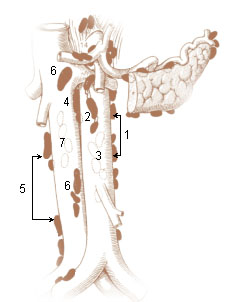
The preaortic lymph nodes lie in front of the aorta, and may be divided into celiac lymph nodes, superior mesenteric lymph nodes, and inferior mesenteric lymph nodes groups, arranged around the origins of the corresponding arteries.

The inferior mesenteric lymph nodes consist of:

The internal iliac lymph nodes surround the internal iliac artery and its branches, and receive the lymphatics corresponding to the distribution of the branches of it, i. e., they receive lymphatics from all the pelvic viscera, from the deeper parts of the perineum, including the membranous and cavernous portions of the urethra, and from the buttock and back of the thigh. The internal iliac lymph nodes also drain the superior half of the rectum, above the pectinate line.

The mastoid lymph nodes are a small group of lymph nodes, usually two in number, located just beneath the ear, on the mastoid insertion of the sternocleidomastoideus muscle, beneath the posterior auricular muscle.

One or two supratrochlear lymph nodes are placed above the medial epicondyle of the humerus, medial to the basilic vein.

The deep cervical lymph nodes are a group of cervical lymph nodes found near the internal jugular vein in the neck.

Supraclavicular lymph nodes are lymph nodes found above the clavicle, that can be felt in the supraclavicular fossa. The supraclavicular lymph nodes on the left side are called Virchow's nodes. It leads to an appreciable mass that can be recognized clinically, called Troisier sign.

The superficial cervical lymph nodes are lymph nodes that lie near the surface of the neck.

The submandibular lymph nodes, three to six in number, are lymph nodes beneath the body of the mandible in the submandibular triangle, and rest on the superficial surface of the submandibular gland.

The superior mesenteric lymph nodes may be divided into three principal groups:
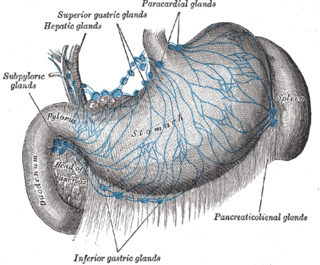
The celiac lymph nodes are associated with the branches of the celiac artery. Other lymph nodes in the abdomen are associated with the superior and inferior mesenteric arteries. The celiac lymph nodes are grouped into three sets: the gastric, hepatic and splenic lymph nodes. They receive lymph from the stomach, duodenum, pancreas, spleen, liver, and gall bladder.

The splenic lymph nodes are found at the splenic hilum and in relation to the tail of the pancreas.

The gastric lymph nodes are lymph nodes which drain the stomach and consist of two sets, superior and inferior:

Parotid lymph nodes are lymph nodes found near the parotid gland in the immune system.
